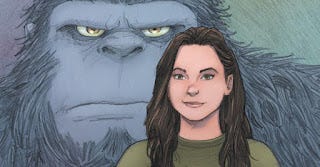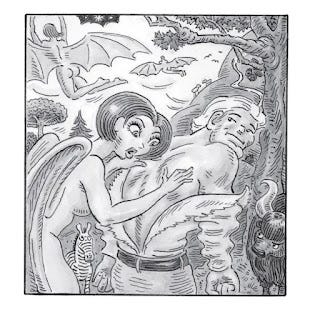.
Fair warning: two books here I really didn't like. One I liked quite a lot. And two were charming looks at the past, one from the past. The real question, as always, is currently unanswered:
What will still matter a year, a decade, a generation from now?
.
114) Frankissstein by Jeanette Winterson, finished November 4
So let's start by saying this book is no good and is further evidence that the people considering the Booker Prize are not broadly read. I have a lot of complaints about Frankissstein but one is that this is clearly a book written by someone with very little experience in science fiction writing science fiction for people with very little experience in science fiction. Large swaths of this book are just people stitching together fun facts the author found on Wikipedia or some pop-science magazine.
In a way, this is less novel and more jigsaw puzzle. She found a bunch of cool puzzles and just found a way to assemble them. Which is cool and all until you look close and notice the pieces don't quite fit together.
I did love the first twenty pages which star Mary Shelley. The other Mary Shelley portions were okay. The 2019 sections were mostly not great though there were moments they rose to the level of fine. Then there were the Bedlam sections which bled into the Mary Shelley portions.
I think I see what she was going for but it never quite worked. Again, it looks like a picture but the pieces don't quite fit together.
And the title is a dumb pun which . . . I guess is about all the sex in the book? I genuinely don't know why it's called Frankissstein.
Another way to think about this book is an older person learned lots of neat things about sexbots and AI and bioengeneering and whatnot and thought no one else has ever heard of these things because she has never heard of them and so she built a book around them. But the book is largely characters saying things to each other they would never need to say because they are experts in their field and already know it. The Ron Lord characters sometimes works as a comic figure and so do some of the other broad stereotypes, but only occasionally. This is a book written for people as ignorant as the author. No one else is falling for it.
Sigh.
Anyway, I don't really regret reading it. I was curious if it would find an interesting destination. It didn't. But I'm glad to know it.
The only thing I regret is the book I didn't read instead. Whatever it may have been.
under a month
115) Motor Girl: No Man Left Behind by Terry Moore, finished November 4
Terry Moore can tell a long story, but he can also tell a short story. This is just two slim volumes (me on#one) and in that space he covers the Iraq war and its complications—both in the field and once back home—mental illness, aliens, government conspiracies. It's funny and it's touching, sexy and sad. Characters look different ways and act different ways. They're all individuals. And the whole thing works as a coherent piece. He's a marvel.
saturday and monday
116) Life on the Moon by Robert Grossman, finished November 10
This is the legendary illustrator's posthumously published (because he died) book on the Great Moon Hoax—although it plays a bit like a hoax itself. Although the final act gets too ludicrous to accept, throughout, famous names like Goodyear and Poe and Audubon and Howe keep popping up and the educated person estimates the math and thinks to themselves, "maaaaaaybe?," but must keep going. (Luckily, Grossman wrote a little explanatory afterword to preempt the need for hundreds of hours on Wikipedia.)
The book's about 400 pages long, with a single captioned illustration on each page.
It's a swift and fun read that never stops being exciting and strange.
two days
117) The Griff by Christopher Moore and Ian Corson with Jennyson Rosero
First, the most positive thing I have to say about this book is that it offers something innovative to how an alien invasion may take place.
The book was originally a screenplay and this shows. The way it cuts between locations feels more Michael Bay than Alan Moore and the clever dialogue seems designed to get bemused laughter from a theater audience, not a solo reader.
The plot is pretty pork and beans. The story tries to make some interesting points about identity but, to return to pigs, is hamfisted about it.
But the worst thing about this book is the character design. The illustrator may be a woman but she's been well socialized into the male gaze. The absurd shapes of the female characters are always on contorted display. And the cartoonishness is emphasized by the characters' static costume. Sexy-goth torn tights, for example, do not survive two months of being chased by dragons.
OH WAIT. I WAS WRONG. JENNYSON IS A DUDE. STILL. MY COMPLAINTS HOLD.
five days
118) Cato by Joseph Addison, finished November 16
After reading an excellent article comparing Washington to Trump (guess who comes off better) and learning about Addison's Cato which was beloved by the Founders—frequently performed and quoted—I decided that I wanted to share this article with next semester's sophomores. But what if we read the play as well? Time to preview it.
First, it's not that long. Just a hundred pages. And so, so much easier to read than Shakespeare, even though he's closer to Shakespeare than we are to him. Partially that's because English had settled down pretty much by then but also because Addison wasn't writing for a Renaissance audience that saw occasional confusion as a net positive. And, I might be wrong here, but I think by this time plays weren't being played to both penny-payers and hifalutins simultaneously, which, again, I'm guessing here, may mean that plays could be more middlebrow rather than having some things clever enough to allow the educated to feel superior than the dick-joke–desirers on the ground. In other words, by not splitting its attentions, it speaks more clearly to a modern audience.
I think.
It doesn't get performed much these days. But a nice revival in Washington of a play about lovers of liberty standing up to blowhards and tyrants might have a place. Perhaps it could be performed in Founders-era costumes. Or perhaps a new play about Washington striving to reach the same thematic goals.
Anyway. It feels very much of now.
I last taught Shakespeare's Julius Caesar right after the 2016 election (guess why) and it felt very apropos. I'll have to consider if I'm brave enough to do two old plays with sophomores. But it's an intriguing idea. And Addison will feel much easier after doing Shakespeare.
I could just do it with AP but then I wouldn't feel like I could include The Atlantic article or Addison's essays or historians on what Rome was like. So I think sophomores it is.
Watch this space in 2025 to see how things turn out.
two hours a week apart






